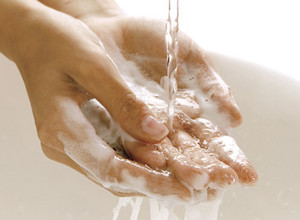Meigs Health Today


Meigs Health Matters: Clean Hands Week was September 17-23, 2023
International Clean Hands Week just concluded, but it is important for us to reflect just how much our hands play a role in the spread of germs, such as bacteria and viruses. On average, our hands can carry more than 3,200 different species of germs, many of which can make you sick or cause infection. Most of the illnesses, including colds and the flu, are caused by germs that have come from contaminated hands and surfaces. According to the CDC, keeping your hands clean can prevent 1 in 3 diarrheal illnesses and 1 in 5 respiratory illnesses, such as the common cold and flu. To decrease the number of germs on our hands and decrease the spread of illnesses, it is important for us to wash our hands thoroughly and frequently.
According to the Ohio Department of Health (ODH), the following steps should be followed when washing your hands:
- Wet your hands with running water and apply soap.
- Rub your hands together to make a lather, and scrub them well (don’t forget under your fingernails and your thumbs!).
- Continue to rub your hands together, getting in between your fingers and the backs of your hands for at least 20 seconds. (About the time it takes to hum ‘Happy Birthday’ twice)
- Rinse your hands well under running water.
- Dry them with a clean paper towel or let them air dry.
Another factor is keeping your hands clean and free of germs if knowing WHEN to wash. According to the Centers for Disease Control and Prevention (CDC), you should wash your hands:
- Before, during, and after preparing food
- Before eating
- Before and after caring for someone at home who is sick with vomiting and/or diarrhea
- Before and after treating a cut or wound
- After using the toilet
- Remember, 1 TRILLION germs can live in one gram of poop (About the size of a paper clip!)
- After touching an animal, animal feed, or animal waste
- After taking out the trash
- And especially after blowing your nose, coughing, or sneezing onto your hands
This is not a comprehensive list of when to wash your hands, but just some examples for when you should.
Hand sanitizer can be also used when a handwashing station is not readily available, but make sure the sanitizer has at least 60% alcohol content. If a handwashing station with soap, running water, and clean towels is available, you should always wash your hands. If you still want to use a hand sanitizer after washing your hands, it will also aid in preventing the spread of germs. Hand sanitizer should be used as a supplement to washing your hands, not as a replacement.
For more information about handwashing, visit the following links:
CDC: https://www.cdc.gov/handwashing/when-how-handwashing.html
ODH: https://odh.ohio.gov/know-our-programs/food-safety-program/food-safety-at-home
Elizabeth Fisher
Environmental Health Specialist in Training






